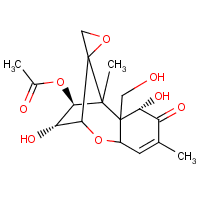Fusarenon X
Agent Name
Fusarenon X
CAS Number
23255-69-8
Formula
C17-H22-O8
Major Category
Biological Agents

Synonyms
12,13-Epoxy-3-alpha,4-beta,7-alpha,15-tetrahydroxytrichothec-9-en-8-one 4-acetate; 3,7,15-Trihydroxy-4-acetoxy-8-oxo-12,13-epoxy-delta(sup 9)-trichothecene; 3alpha,7alpha,15-Trihydroxy-4beta-acetoxy-12,13-epoxytrichothec-9-en-8-one; 4-Acetyloxy-12,13-epoxy-3,7,15-trihydroxy-(3-alpha,4-beta,7-alpha)-trichothec-9-en-8-one; Fusarenon; Fusarenone X; Nivalenol monoacetate; Nivalenol-4-O-acetate; Trichothec-9-en-8-one, 12,13-epoxy-3alpha,4beta,7alpha,15-tetrahydroxy-, 4-acetate; Trichothec-9-en-8-one, 4-(acetyloxy)-12,13-epoxy-3,7,15-trihydroxy-, (3alpha,4beta,7alpha)-; [ChemIDplus]
Category
Mycotoxins
Description
Transparent solid; [HSDB]
Sources/Uses
A mycotoxin produced by Fusarium nivale; [ChemIDplus] Zearalenone, deoxynivalenol, and fusarenon X are mycotoxins produced by three Fusarium species (F. graminearum, F. culmorum, and F. crookwellense) that grow on wheat, barley, and maize in humid conditions. [IARC] Human exposure to Fusarenon X is rare; [IARC]
Comments
Trichothecene mycotoxins causes bone marrow suppression, leukopenia, immunosuppression, and secondary sepsis; [HSDB] Causes diarrhea and muscle weakness at lethal doses fed to rats; Causes hepatocellular necrosis in cats after subcutaneous doses; [RTECS] LD50 (mice) = 3-5 mg/kg by all routes; Causes cellular destruction in rapidly dividing cells of the GI tract, thymus, lymph nodes, spleen, bone marrow, ovaries, and testes; Exposed animals have diarrhea, food refusal, and vomiting; Highly irritating to the skin of animals causing necrosis of hair follicles and dermis; [IARC] See "T-2 toxin."
Reference Link #1
Biomedical References
Adverse Effects
Toxic Pneumonitis
Yes
Hepatotoxin
Hepatoxic (a) from occupational exposure (secondary effect) or (b) in animal studies or in humans after ingestion
Dermatotoxin
Skin burns
IARC Carcinogen
Not classifiable
Diseases, Processes, and Activities Linked to This Agent
Other Information
No other related information on this agent was found.